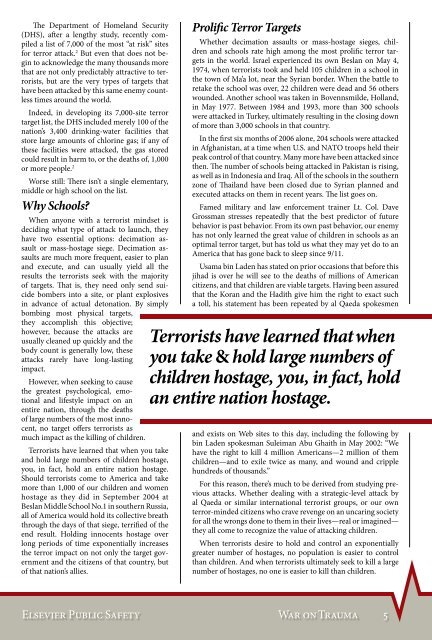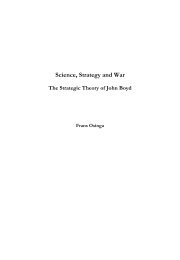Lessons Learned from a Decade of Conflict - Boekje Pienter
Lessons Learned from a Decade of Conflict - Boekje Pienter
Lessons Learned from a Decade of Conflict - Boekje Pienter
You also want an ePaper? Increase the reach of your titles
YUMPU automatically turns print PDFs into web optimized ePapers that Google loves.
The Department <strong>of</strong> Homeland Security(DHS), after a lengthy study, recently compileda list <strong>of</strong> 7,000 <strong>of</strong> the most “at risk” sitesfor terror attack. 2 But even that does not beginto acknowledge the many thousands morethat are not only predictably attractive to terrorists,but are the very types <strong>of</strong> targets thathave been attacked by this same enemy countlesstimes around the world.Indeed, in developing its 7,000-site terrortarget list, the DHS included merely 100 <strong>of</strong> thenation’s 3,400 drinking-water facilities thatstore large amounts <strong>of</strong> chlorine gas; if any <strong>of</strong>these facilities were attacked, the gas storedcould result in harm to, or the deaths <strong>of</strong>, 1,000or more people. 2Worse still: There isn’t a single elementary,middle or high school on the list.Why Schools?When anyone with a terrorist mindset isdeciding what type <strong>of</strong> attack to launch, theyhave two essential options: decimation assaultor mass-hostage siege. Decimation assaultsare much more frequent, easier to planand execute, and can usually yield all theresults the terrorists seek with the majority<strong>of</strong> targets. That is, they need only send suicidebombers into a site, or plant explosivesin advance <strong>of</strong> actual detonation. By simplybombing most physical targets,they accomplish this objective;however, because the attacks areusually cleaned up quickly and thebody count is generally low, theseattacks rarely have long-lastingimpact.However, when seeking to causethe greatest psychological, emotionaland lifestyle impact on anentire nation, through the deaths<strong>of</strong> large numbers <strong>of</strong> the most innocent,no target <strong>of</strong>fers terrorists asmuch impact as the killing <strong>of</strong> children.Terrorists have learned that when you takeand hold large numbers <strong>of</strong> children hostage,you, in fact, hold an entire nation hostage.Should terrorists come to America and takemore than 1,000 <strong>of</strong> our children and womenhostage as they did in September 2004 atBeslan Middle School No.1 in southern Russia,all <strong>of</strong> America would hold its collective breaththrough the days <strong>of</strong> that siege, terrified <strong>of</strong> theend result. Holding innocents hostage overlong periods <strong>of</strong> time exponentially increasesthe terror impact on not only the target governmentand the citizens <strong>of</strong> that country, but<strong>of</strong> that nation’s allies.Prolific Terror TargetsWhether decimation assaults or mass-hostage sieges, childrenand schools rate high among the most prolific terror targetsin the world. Israel experienced its own Beslan on May 4,1974, when terrorists took and held 105 children in a school inthe town <strong>of</strong> Ma’a lot, near the Syrian border. When the battle toretake the school was over, 22 children were dead and 56 otherswounded. Another school was taken in Bovennsmilde, Holland,in May 1977. Between 1984 and 1993, more than 300 schoolswere attacked in Turkey, ultimately resulting in the closing down<strong>of</strong> more than 3,000 schools in that country.In the first six months <strong>of</strong> 2006 alone, 204 schools were attackedin Afghanistan, at a time when U.S. and NATO troops held theirpeak control <strong>of</strong> that country. Many more have been attacked sincethen. The number <strong>of</strong> schools being attacked in Pakistan is rising,as well as in Indonesia and Iraq. All <strong>of</strong> the schools in the southernzone <strong>of</strong> Thailand have been closed due to Syrian planned andexecuted attacks on them in recent years. The list goes on.Famed military and law enforcement trainer Lt. Col. DaveGrossman stresses repeatedly that the best predictor <strong>of</strong> futurebehavior is past behavior. From its own past behavior, our enemyhas not only learned the great value <strong>of</strong> children in schools as anoptimal terror target, but has told us what they may yet do to anAmerica that has gone back to sleep since 9/11.Usama bin Laden has stated on prior occasions that before thisjihad is over he will see to the deaths <strong>of</strong> millions <strong>of</strong> Americancitizens, and that children are viable targets. Having been assuredthat the Koran and the Hadith give him the right to exact sucha toll, his statement has been repeated by al Qaeda spokesmenTerrorists have learned that whenyou take & hold large numbers <strong>of</strong>children hostage, you, in fact, holdan entire nation hostage.and exists on Web sites to this day, including the following bybin Laden spokesman Suleiman Abu Ghaith in May 2002: “Wehave the right to kill 4 million Americans—2 million <strong>of</strong> themchildren—and to exile twice as many, and wound and cripplehundreds <strong>of</strong> thousands.”For this reason, there’s much to be derived <strong>from</strong> studying previousattacks. Whether dealing with a strategic-level attack byal Qaeda or similar international terrorist groups, or our ownterror-minded citizens who crave revenge on an uncaring societyfor all the wrongs done to them in their lives—real or imagined—they all come to recognize the value <strong>of</strong> attacking children.When terrorists desire to hold and control an exponentiallygreater number <strong>of</strong> hostages, no population is easier to controlthan children. And when terrorists ultimately seek to kill a largenumber <strong>of</strong> hostages, no one is easier to kill than children.Elsevier Public Safety War on Trauma 5
















